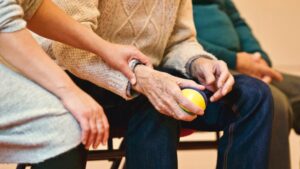Can Caregiver Self-Care Be Selfish?
Is it Selfish for a Caregiver to Take a Break?
It depends. If a caregiver is leaving an incapacitated loved one unattended or in an unsafe situation, the answer could be yes. But this is (hopefully) rare.
Real-life situations?
I was speaking to a group about caregiving, and one lady lamented, “My mom is so sick with cancer, I feel guilty when I do anything enjoyable.” Sad, but unfortunately many of us can relate to how she feels.
In “Remarkable Caregiving”, there is a story of a couple, Sandra and Ken. They took in Sandra’s dad, who had Parkinson’s, to live with them. We read, “At times, when her husband could see Sandra reaching a breaking point, he would say, ‘I’m going to take care of Dad Friday night, and you go to a hotel’. “
Selfish or selfcare? You be the judge.
Guilt, exhaustion, and burnout often happen while caregiving. What can a caregiver do to address their own needs without being selfish? We find ideas from HelpGuide*.
- Maintain your personal relationships. Don’t let your friendships get lost in the shuffle of caregiving. These relationships will help sustain you and keep you positive. If it’s difficult to leave the house, invite friends over to visit with you over coffee, tea, or dinner.
- Share your feelings. The simple act of expressing what you’re going through can be very cathartic. Sharing your feelings with family or friends won’t make you a burden to others. In fact, most people will be flattered that you trust them enough to confide in them, and it will only strengthen your bond.
- Prioritize activities that bring you enjoyment. Make regular time for hobbies that bring you happiness, whether it’s reading, working in the garden, tinkering in your workshop, knitting, playing with the dogs, or watching the game.
- Find ways to pamper yourself. Small luxuries can go a long way towards relieving stress and boosting your spirits. Light candles and take a long bath. Ask your spouse for a back rub. Get a manicure. Buy fresh flowers for the house. Whatever makes you feel special.
- Make yourself laugh. Laughter is an excellent antidote to stress—and a little goes a long way. Read a funny book, watch a comedy, or call a friend who makes you laugh. And whenever you can, try to find the humor in everyday situations.
- Get out of the house. Seek out friends, family, and respite care providers to step in with caregiving so you can have some time away from the home.
*For more ideas and information visit https://www.helpguide.org/articles/stress/caregiver-stress-and-burnout.htm. HelpGuide is a small independent nonprofit that runs one of the world’s top 10 mental health websites. Over 50 million people from all around the world turn to HelpGuide each year for trustworthy content they can use to improve their mental health and make healthy changes.
Find more caregiving resources and information on Nancy’s books, including “Remarkable Caregiving: The Care of Family and Friends” at https://nancyrpoland.com/caregiver-resources/



